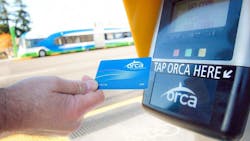What’s normalizing first for transit? Fare collection.
Fare collection is resuming on several systems that suspended fares to boost safety by reducing interactions between riders and operators during the COVID-19 pandemic. Despite the return of fares, the bottoming out of people using traditional transit modes is likely to continue past the short term.
The suspension of fares helped support essential workers use of transit while protecting transit employees, but it also exacerbated the growing financial crisis the industry finds itself in because of the pandemic.
The American Public Transportation Association (APTA) first estimated lost farebox revenues for United States agencies to be $7.65 billion. However, an economic analysis by EBP US, Inc., determined fare revenue is down 86 percent from April 2019 to April 2020, which would put farebox losses north of $13 billion.
In Canada, the Canadian Urban Transit Association reports 2019 fares collected by agencies totaled C$4.3 billion (US$3.05 billion), but the association says farebox revenue is down more than 90 percent since the pandemic began to impact transit.
The Coronavirus Aid, Relief and Economic Security (CARES) Act included $25 billion to provide emergency financial relief to U.S. transit agencies and the Heroes Act, which passed the U.S. House of Representatives on May 15, included an additional $15.75 billion. Canada’s federal government has yet to deliver an emergency relief package specific to transit and the return to fare collection helps ease the financial stress.
Metro Vancouver’s TransLink will begin collecting fares on June 1. The agency expects to collect C$2 million (US$1.44 million) per month based on current ridership levels, but that is small consolation against the estimated C$75 million (US$53.87 million) per month in total lost revenue.
The reason many agencies are returning to fare collection isn’t the lifting of stay-at-home orders, but the execution of other safety measures such as driver barriers. TransLink, BC Transit, Grand River Transit, IndyGo, Trinity Metro and Pierce Transit are among agencies to install plexiglass or vinyl barriers at the operator’s compartment to make fare collection possible.
Other agencies, such as New Orleans Regional Transit Authority and Via Metropolitan Transit in San Antonio, are encouraging fare purchases through a mobile app to further honor social distancing when using transit.
When systems will return to fare collection:
- May 4
- IndyGo resumed fare collection on all services and will return to regular weekday service June 1.
- May 17
- Trinity Metro resumed fare collection on buses, TEXRail and ACCESS paratransit.
- New Orleans Regional Transit Authority began collecting fares on all bus and streetcar routes.
- Southeastern Pennsylvania Transportation Authority resumed service on all bus and trolley routes with front-door boarding and fare payment.
- June 1
- Sound Transit will implement special “recovery fares” for the month June
- Community Transit will begin charging fares for Swift Blue and Swift Green bus rapid transit lines.
- VIA Metropolitan Transit will begin collecting fares for all services.
- St. Louis Metro Transit will resume front-door boarding and fare collection on MetroBus vehicles.
- Grand River Transit (GRT) will resume fare collection on all GRT buses, MobilityPLUS and ION light rail.
- BC Transit will begin charging fares for all services
- TransLink will begin charging fares on all buses
- June 14
- Pierce Transit will begin charging fares for buses and SHUTTLE paratransit vehicles.
About the Author

Mischa Wanek-Libman
Group Editorial Director
Mischa Wanek-Libman is director of communications with Transdev North America. She has more than 20 years of experience working in the transportation industry covering construction projects, engineering challenges, transit and rail operations and best practices.
Wanek-Libman has held top editorial positions at freight rail and public transportation business-to-business publications including as editor-in-chief and editorial director of Mass Transit from 2018-2024. She has been recognized for editorial excellence through her individual work, as well as for collaborative content.
She is an active member of the American Public Transportation Association's Marketing and Communications Committee and served 14 years as a Board Observer on the National Railroad Construction and Maintenance Association (NRC) Board of Directors.
She is a graduate of Drake University in Des Moines, Iowa, where she earned a Bachelor of Arts degree in Journalism and Mass Communication.
